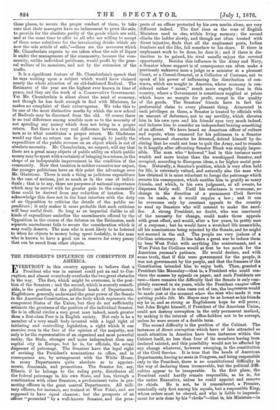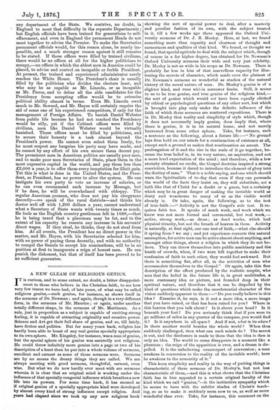THE PRESIDENT'S INFLUENCE ON CORRUPTION IN AMERICA.
EVERYBODY in this country appears to believe that a President who was in earnest could put an end to Cor- ruption, and almost everybody overlooks the two great obstacles In the way. The first, which might be overcome, is the posi- tion of the Senators ; and the second, which is scarcely remedi- able, is the position of the political heads of Departments. Englishmen generally understand the great power of the Senate in the American Constitution, as the body which represents the component States of the Union, but they do not sufficiently estimate the greatness of the position of the individual Senator. He is in official circles a very great man indeed, much greater than a first-class Peer is in English society. Not only is he a member of a very small body invested with a legal right of initiating and controlling legislation, a right which it can exercise even in the face of the opinion of the majority, not only is he the representative of an organised and most powerful entity, the State, stronger and more independent than any capital city in Europe, but he is, for officials, the actual dispenser of patronage. The Senators have the legal right of revising the President's nominations to office, and in consequence are, by arrangement with the White House, in many Departments quite absolute as to appoint- ments, dismissals, and promotions. The Senator for, say, Illinois, if he belongs to the ruling party, distributes all the federal patronage in his own State, and has, through a combination with other Senators, a predominant voice in pro- moting officers in the great central Departments. All mili- tary officers, for instance, are trained at West Point, and are supposed to have equal chances ; but the prospects of an officer "protected " by a well-known Senator, and the pros-
pects of an officer protected by his own merits alone, are very different indeed. The first rises as the sons of English Ministers used to rise, within living memory ; the second climbs the ladder slowly, and though not often treated with direct injustice, finds that all the unpleasant posts, Indian frontiers and the like, fall somehow to his share. If there is unpleasant work to be done, he does it ; and if there is dis- tinction to be gained, his rival usually enjoys the coveted opportunity. Besides this influence in the Army and Navy, a Senator whose support is of consequence can often make a previously unknown man a judge or a minister at a pleasant Court, or a Consul-General, or a Collector of Customs, not to speak of his power of influencing the distribution of con- tracts, which are sought in America, where economy is con-
sidered rather " mean," much more eagerly than in this country, where a Government is sometimes supplied at prices which leave no margin for profit, except in the quality of the goods. The Senators' friends have in fact the preferential claim to every pleasant thing. Armoured in such privileges as these, a Senator is treated by officials with an amount of deference, not to say servility, which elevates him in his own eyes and his friends' eyes very much indeed, and induces him to consider an independent bearing something of an affront. We have heard an American officer of culture and repute, when censured for his politeness to a Senator whose personal character he detested, defend himself by de- claring that he could not bear to quit the Army, and to remain in it happily after affronting Senator Blank was simply impos- sible. The man who " kotowed" had in this instance more wealth and more brains than the worshipped Senator, and occupied, according to European ideas, a far higher social posi- tion. Naturally, a Senator's position, which is very often held for life, is extremely valued, and naturally also the man who has obtained it is most reluctant to forego the patronage which secures his consequence, which enables him to gratify so many friends, and which, in his own judgment, at all events, he dispenses fairly well. Until his reluctance is overcome, no change in the direction of a permanent Civil Service can be made, as it would require a law ; and it can be overcome only by constant appeals to the country to send up Senators who will consent to make the sacri- fice. A strong President, no doubt, who was convinced of the necessity for change, could make those appeals with great effect, and would, after a few years, be pretty sure of a response ; but he would have a wretched life meanwhile, all his nominations being rejected by the Senate, and he might not succeed in the end. The people are very jealous of a Civilian aristocracy. It has taken a great war to induce them to bear West Point with anything like contentment, and a West Point for Civilians would at first be too much for the American yeoman's patience. He would declare, and with some truth, that if this were government for the people, it was not government by the people, and that the framers of the Constitution intended him to enjoy both. Then, granted a President like Macaulay—that is, a President who could con- vince the masses by appeals on paper, and such Presidents are rare—there remains the difficulty that the Senate is only com- pletely renewed in six years, while the President vacatoo taco in four ; and that in nine cases out of ten, the impression would be made just at the moment when gm man who made it was quitting public life. Mr. Hayes may be as honest as his friends say he is, and as strong as Englishmen hope he will prove ; but John Bright himself, if President of the American Union, could not destroy corruption in the only permanent method, by making it the interest of office-holders not to be corrupt, unless he were secure of a double term.
The second difficulty is the position of the Cabinet. The instances of direct corruption which have of late attracted so much attention in America have been instances within the Cabinet itself, no less than four of its members having been declared tainted, and this possibility would not be affected by any change whatever, however sweeping, in the constitution of the Civil Service. It is true that the heads of American Departments, having no seats in Congress, and being responsible only to the President, there is no constitutional difficulty in the way of declaring them irremovable, but the political diffi- culties appear to be insuperable. In the first place, the President could hardly remain responsible, as he is, for the entire Executive, unless he could appoint and remove its chiefs. He is not, be it remembered, a Premier, nominally only first among his equals, but a responsible King, whose orders must be obeyed, and who is liable to impeach- ment for acts done by his "clerks"—that is, his Ministers—in any department of the State. We contrive, no doubt, in England to meet that difficulty in the separate Departments ; but English officials have been trained for generations to self- effacement, and even in England the permanent Heads do not meet together to advise the Premier. To make the Secretaries permanent officials would, for this reason alone, be nearly im- possible, and a much stronger reason against it still remains to be stated. If these offices were filled by trained civilians, there would be no offices at all for the higher politicians to occupy,—no offices in which the ablest men in America could be placed, to advise and control an incapable or feeble President. At present, the trained and experienced administrator rarely reaches the White House. The President's chair is usually filled by the politician who divides the electors least, and who may be as capable as Mr. Lincoln, or as incapable as Mr. Pierce, and to debar all the able candidates for the Presidency from accepting office would be to ostracise political ability almost in terms. Even Mr. Lincoln owed much to Mr. Seward, and Mr. Hayes will certainly require the aid of some one of his experienced competitors, if only for the management of Foreign Affairs. To banish Daniel Webster from public life because he had not reached the Presidency would be silly, yet if the Cabinet offices were filled by civilians, men like Daniel Webster would be virtually banished. Those offices must be filled by politicians, and to secure their honesty is a task almost beyond the President's power. He cannot even select them freely, for he must respect any bargains his party may have made, and he cannot by any effort of his own secure them decent pay. The prominent men in American politics are usually poor men, and to make poor men Secretaries of State, place them in the most expensive capital in the world, and pay them less than £2,000 a year, is to offer them every temptation for illicit gain. Yet this is what is done in the United States, and the Presi- dent, as President, has no power to alter the system. He can instigate his own party to vote an increase of salaries, or he can even recommend such increase by Message, but if he does, he will be overwhelmed with obloquy. The regular American yeoman, who does not pay his clergyman decently—we speak of the rural districts—and thinks his doctor well off with 1,200 dollars a year, cannot understand what a Secretary of State wants with twenty times as much. He feels as the English country gentleman felt in 1688,—that he is being taxed that a placeman may be fat, and to the extent of his capacity he resents any increase in his servants' direct wages. If they steal, he thinks, they do not steal from him. At all events, the President has no direct power in the matter, and Mr. Hayes, with his Secretaries selected for him, with no power of paying them decently, and with no authority to compel the Senate to accept his nominations, will be in no position at first to inaugurate a reign of honest men. He can punish the dishonest, but that of itself has been proved to be no sufficient guarantee.



































 Previous page
Previous page